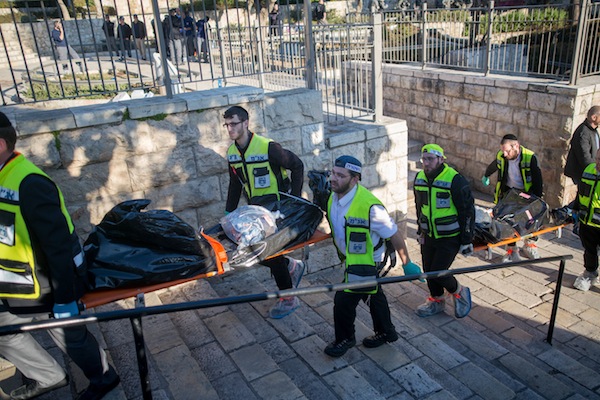Palestinian rights groups call decision to hold onto the bodies of 13 Palestinian attackers and alleged attackers a ‘violation of the right to dignity.’ Since beginning of recent wave of violence, over 220 Palestinians have been shot dead by Israeli security forces.

For 300 days Israel has been holding onto the frozen body of Tha’er Abu Ghazaleh, one of 13 East Jerusalem Palestinian attackers and alleged attackers whose bodies Israeli authorities, since October, are refusing to return to their families for burial.
In mid-October 2015, the Israeli security cabinet decided to stop its practice of returning bodies immediately to the deceased’s families. The rationale was that large funerals might lead to public disorder. The ban only exists in Jerusalem. The bodies of West Bank attackers have been returned to their families for burial.
Israeli police committed to returning the bodies as part of a deal reached on the sidelines of a High Court case in early May, which was supposed to be completed by the start of Ramadan a month later.
Before the deal could be fully implemented, however, Public Security Minister Gilad Erdan ordered a halt to the transfers after only four bodies were handed over, accusing one family of reneging on the terms that sought to limit the number of attendees at the funeral.
In the latest hearing on the matter, Israel’s High Court of Justice ordered the state to explain by August 15 why it still insists on holding onto the bodies.
Since the beginning of the latest round of violence in September 2015, 36 Israelis have been killed by Palestinians in stabbings, shootings, and vehicular attacks, while 223 Palestinians have been shot dead by the army or police during attacks, suspected attacks and in demonstrations.
Many accuse Israeli authorities of extrajudicial killings of Palestinian attackers and suspected attackers, deliberately using deadly force when non-lethal methods of neutralizing and apprehending suspects might be available. In at least one case, a soldier was filmed shooting a disarmed, prone Palestinian attacker in the head. He is currently on trial.
In a letter to European Union officials last week, a coalition of Palestinian rights groups described the current Israeli policy as “political intransigence rather than a concern for public security.”
“According to [international human rights law], failing to return the bodies of the deceased is a violation, inter alia, of the right to dignity, freedom of religion, and the right to practice one’s culture,” wrote the rights groups, Adalah, Addameer, Al-Haq, and the Civic Coalition for Palestinian Rights in Jerusalem.
In addition to the legal battle, members of Knesset from the Joint List have played a role in trying to attain the release of the bodies. Members of Knesset from Balad were suspended from the Knesset for meeting with the family members of the deceased.
The Arab MKs’ advocacy on the matter was one of the motivations cited by Prime Minister Benjamin Netanyahu for advancing legislation, which became law late last month, allowing the expulsion of elected representatives from parliament.
“We are not prepared to accept a situation in which MKs support the families of those who murder Israeli citizens,” Netanyahu said at the time. “There’s something called national pride.”
Israel is known for placing enormous value on securing the return and proper burial of its own citizens’ and combatants’ bodies from enemy hands, and has previously released hundreds of Palestinian prisoners in exchange for the bodies of dead soldiers.


